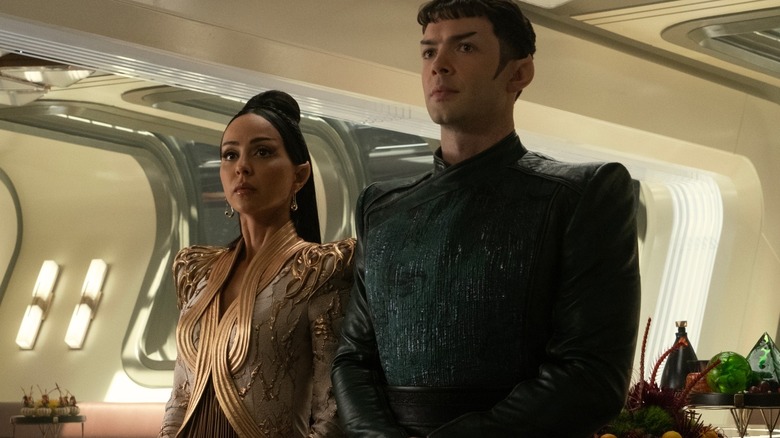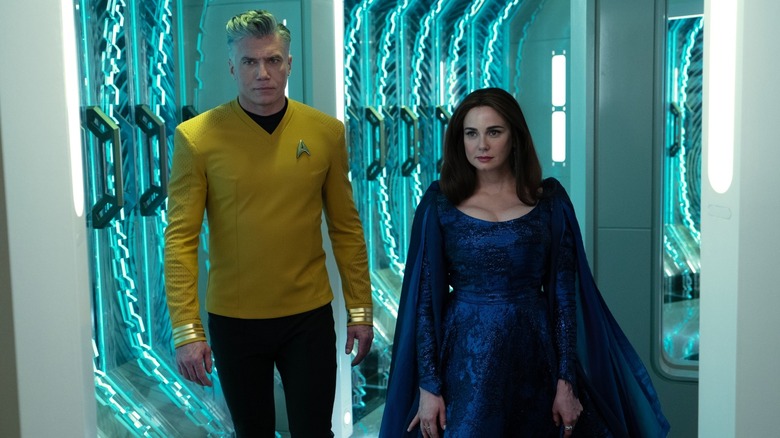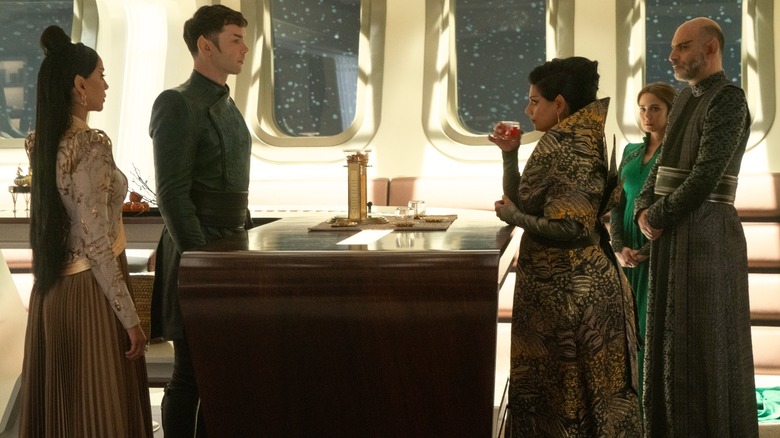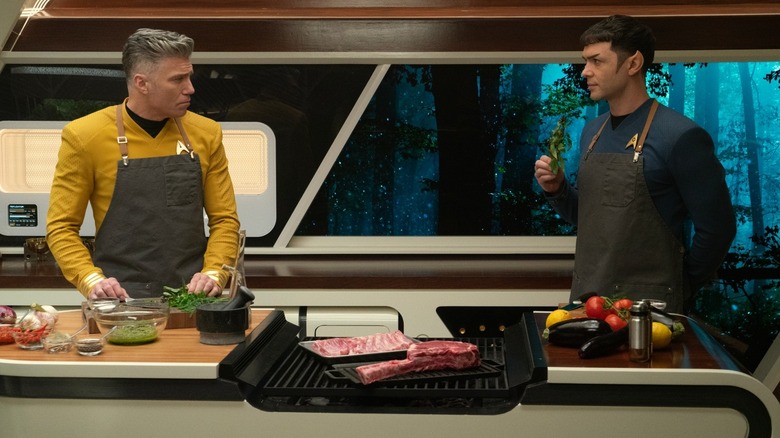Star Trek: Strange New Worlds Season 2 Episode 5 Sees A Visit From The In-Laws
"Star Trek" is versatile and can occupy just about any genre. The better episodes tend to be about moral dilemmas or diplomatic crises, but there is still plenty of room for espionage, for horror, for legal drama, for mystery. Trek is weakest when it begins to think it's an action franchise, but its action-forward movies and "Picard" seasons tend to be more popular than the more cerebral ones, so what do I know? Overall, however, Trek is a workplace drama first and foremost and operates most impressively when it focuses on workplace relationships, the chain of command, building up managerial skills, and applying one's workplace skills to the beneficial operation of a starship. When one cannot perform their duties, it becomes a personal, almost existential problem for "Star Trek" characters. Being useful is the only currency in the future.
When a character's personal problems — like, say family — intervene, it's typically presented as a comedic affair, as the façade of Starfleet propriety will drop, and the officers will have to be out of their element. Worf (Michael Dorn) is a little embarrassed by his outspoken parents. Picard (Patrick Stewart) bickers with his vintner brother. Most notably, Deanna Troi (Marina Sirtis) will be mortified by her horny mother Lwaxana (Majel Barrett). When it comes to family, audiences are permitted to see ordinarily unflappable "Star Trek" characters be thoroughly flapped.
The most recent episode of "Star Trek: Strange New Worlds," called "Charades," is a full-bore, old-fashioned sitcom about the stress provided by visiting would-be in-laws. Indeed, "Charades" feels more or less a straight riff on "The Birdcage," wherein Spock (Ethan Peck) has to impress the visiting parents of his romantic intended, T'Pring (Gia Sandhu). The problem? Aliens have transformed Spock into a human. Cue 1960s "uh-oh" music.
The Birdcage on the Enterprise
Spock, as all good Trekkies know, is half human and half Vulcan. Long ago, he elected to live life according to the tenets of Vulcan logic and has struggled his whole life to rid his mind of emotions. "Strange New Worlds" is a lighter, more comedic show than the Treks that came before, so Spock's struggles have manifested in comedic or romantic ways. There is, for instance, a lot of sexual tension between Spock and Nurse Chapel (Jess Bush) who has openly declared her attraction to him. When they're assigned on a shuttlecraft mission together, Spock summarily ignores his co-worker; he is, after all, engaged to T'Pring.
But, wouldn't you know it, there's a shuttle accident and Spock is injured. As it so happens, though, there is a species of ineffable noncorporeal aliens at the site of the accident. The aliens scan for injuries and find that one human and one half-human are on board. The mix of species confuses them and, like the telepods in "The Fly," they use their medical magic to rid Spock's body of Vulcan DNA. He beams back to the Enterprise fully human. This happens about a week before a visit from T'Pring's parents, a visit that Spock was already stressed out about; he has to impress them or they won't give the marriage their blessing.
The bulk of the episode is devoted to Spock learning how to be Vulcan again while his new human impulses drive him to increasingly comedic mishaps. He laughs at jokes, enjoys eating bacon (Vulcans are vegetarians), gets annoyed with sloppy eaters, and admits that he's sexually attracted to every person in his vicinity. Given how attractive the "Strange New Worlds" cast is, one can hardly blame him. Being human is like being a teenager.
Trek can be funny ... sometimes
Despite all his training from his "helpful" crewmates ("helpful" in quotes because they inundate him with advice), Spock is still ousted at a vital Vulcan tea ceremony with T'Pring's parents. The episode ends with a few reconciliations and a shocking romantic overture that will have to be dealt with in next week's episode. Tantalizing, tantalizing.
Naturally, Spock will eventually be restored.
This is not the first time a half-alien character has had to face their human side on "Star Trek." In the "Star Trek: Voyager" episode "Faces" (May 8, 1995), the half-Klingon character B'Elanna Torres (Roxann Dawson) was cloned by a species called the Vidiians, and she emerged as a human character and a Klingon character. Her two warring identities were able to have a literal conversation. Spock, who had been struggling with emotional outbursts and who was undergoing special therapies to remain as logical and emotionless as possible, now had to face his human side directly. "Charades," however, gives any contemplation of cultural identity a backseat to comedic shenanigans. This may be disappointing to those who wanted a more thoughtful episode, but it's ultimately forgivable because, well, the episode is legitimately funny.
"Star Trek" doesn't always do comedy well. One might recall the "Star Trek: Deep Space Nine" episode "Profit and Lace" (May 11, 1998) wherein the Ferengi Quark (Armin Shimerman) had to undergo gender reassignment surgery just to close a profitable labor deal with a visiting Dominion dignitary. The episode is supposed to wring yuks from the sight of Quark in a dress, but it felt retrograde and sexist even in 1998. More successful was "The Trouble with Tribbles" (December 29, 1967) which saw Kirk (William Shatner) losing patience with bickering agricultural secretaries and the menacing, cooing furball creatures eating their grain.
The disappointment of romance
"Star Trek: Strange New Worlds" has remained strong throughout its run. Like classic "Star Trek," it has often been very good about focusing on the weekly drama of a single character, rather than feeling the crushing need to incorporate the entire ensemble in every story (Pelia, the Enterprise's long-lived engineer, is absent for this episode). This allows for tighter stories that allow its characters to flourish. There aren't galaxy-ending crises every week, and the characters are permitted to be seen outside of "panic mode." It's utterly refreshing.
But the balance can be tipped. Pushing too hard into the personal lives of the characters can lead to unfortunate soap opera dynamics wherein romantic intrigues and personal problems begin to outstrip the workplace drama. The end of "Charades" provides a romantic cliffhanger of sorts, when two characters kiss and, it is implied, fall in bed together. As any longtime TV watcher can tell you, breaking sexual tension only provides a momentary release. The drama that follows is rarely as interesting as the tension before. It would be much better to allow the sexual tension to remain or, more tactfully, spoken about frankly and openly without requiring the actual deed. I'm not being prudish here; I love a good sex scene. But with long-term serialized storytelling, one must deal with growing sexual relationships between co-workers with tact.
"Strange New Worlds" left audiences with a startling sexual reveal, but also in a position of a soap opera. The "twist" isn't so dramatic as it was the introduction of something awkward. Luckily, these are not characters to let such an event slide. They'll be talking about it soon enough.



